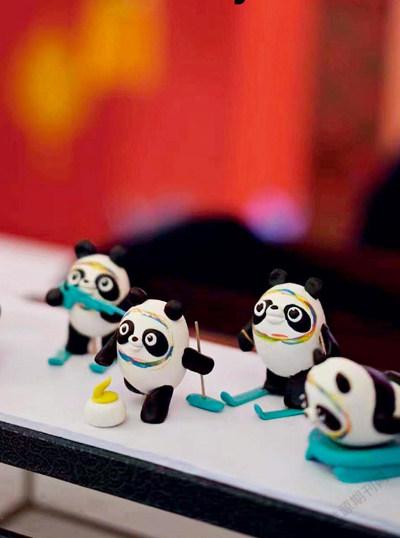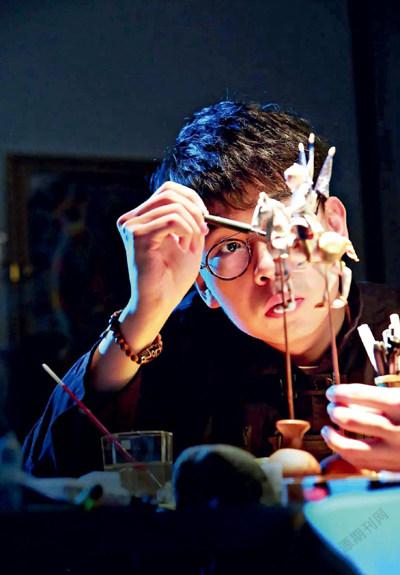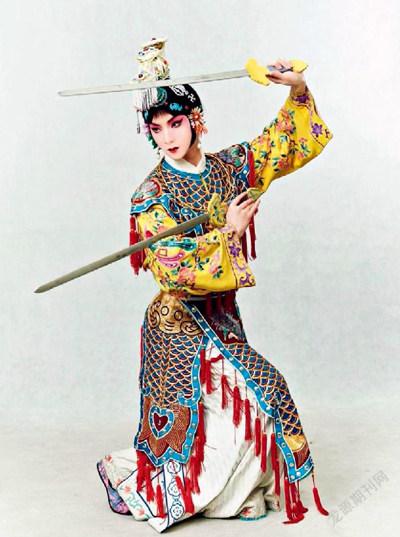Gen Z Cultural Inheritors Guard Tradition In Modern Ways
Tao Xing



Grior to an Olympic welcoming banquet on February 5 at the Great Hall of thePeople in Beijing, hosted by Chinese President Xi Jinping and his wife Peng Liyuan, Prince of Monaco Albert II tried his hand at dough sculpting. The volunteer helping His Serene Highness knead the doe-eyed Bing DwenDwen, roly-poly mascot of the Beijing 2022 Winter Olympics, was 26-year-old Lang Jiaziyu, a third-generation inheritor of Dough Figurines Lang (Mian Ren Lang in Chinese), a National Intangible Cultural Heritage item since 2008.
The term “cultural inheritor” often conjures up images of an elderly man carefully exercising his chosen craft. But their longstanding arts will eventually pass on to the younger generations who will in turn lift their given tradition to higher, modern levels.
The dough figurine, also known as a “glutinous rice figurine,” is a traditional Chinese art form using wheat and glutinous rice flour as its main ingredients. The Lang family staple sculpture was an original creation courtesy of Lang Shaoan (1909-1992), Lang Jiaziyu’s grandfather.
An important reference for the study of Beijing folk customs and handicrafts, Lang Family’s dough art subject matter initially homed in on the traditional life of Beijingers.But for the young inheritor, pop culture icons—think Marvel comic characters, Slam Dunk figures, sneakers and, of course, Bing DwenDwen—have become the style of today.GuoYuang also breaks through the barriers of routine in his field. The 24-year-old is a third-generation heir to the Mei School of Peking Opera, created by the opera’s maestro Mei Lanfang (1894-1961). Mei was exclusively known for his female lead roles (dan), especially his portrayal of the genre’s particularly young and middle-aged women (qingyi). Guo’s master Zhang Nanyun once studied under Mei.
Unlike most opera school students, who will try to join a troupe following graduation, Guo chooses to perform Peking Opera snippets on short video platform Douyin, China’s version of TikTok.
“My master supports my decision. She may be in her 80s, but she is very open-minded,” Guo said. “She believes the arts should never be rigid in form, whether on stage or social media.”
A Modern Makeover
Like many of Lang and Guo’s peers, China’s Gen Zs (born between 1995 and 2009) are children of the digital era. From multi-purpose social media apps like WeChat to video-sharing platforms like Bilibili and Douyin, online tools have shaped how the younger Chinese generation connects with their nation and the world at large.
The previous generation still prefers the traditional stage performance given they grew up in an era without digital media, according to Guo.But profound technological shifts have changed people’s lives, and the arts, in many ways. Guo added, “I think online performances can reach wider, more diversified audiences, and especially young adults.”
As of December 2020, China had 989 million netizens; its internet penetration had reached 70.4 percent. Students made up the largest portion of online users in the country, accounting for 21 percent, according to a report released by the China Internet Network Information Center on February 3, 2021. Additionally, Douyin had over 600 million active daily users nationwide as of August 2020, the app’s parent company ByteDance said.
An online performance can encourage more people to go get a ticket for the stage version, Guo said. Going through the numerous messages he received on his account every day, he found that many of his followers did in fact go to the theater to catch a Peking Opera show—after watching his Douyin snippets.
“When I’m preparing for a live-stream, I will create subtitles and further ‘necessary’ explanations in advance to help audiences better grasp the show’s essence,” Guo added.Lang echoed Guo’s views. “We, as young inheritors,heavily dabble in social media; we know what today’s youthaudiences like,” he said. Take the dough figurines, for example. Lang explained that in the past, people would lean moretoward sculptures of opera characters, whereas nowadays,young adults favor more“pop cultural” figures.
“Our creations should always keep in step with the times,”he underlined.
Devoted to the Arts
Lang has been carving out a tailored social media presencesince his student days. He usually first posts a video of hisproduction process, then shows audiences how they canmake their own statuettes and, as a follow-up, streams hisconversations with other cultural inheritors. This get-up-and- go attitude has gained him a combined social media following of nearly 2 million.
Huge social traffic can also producenew business opportunities, includingadvertising and brand endorsementdeals. These in turn provide Lang with the financial support to evolve his career and promote his inherited skill to youngergenerations.
The purpose is clear-cut: spread Chinese culture far and wide, according to Lang.
Old or young, master or pupil, stageor social media, the core of traditionalcraftsmanship remains unchanged,Guo chimed in.“It’s all about our shareddeep devotion to Peking Opera, as well as Chinese culture and tradition,” he said.
Judging by the wide-ranging questions they receive, both inheritors said they can truly feel young people are interested inand proud of these time-honored arts. For his next step, Guo plans to record morevideos about Peking Opera.
“I hope society can guide younger
minds and provide them with morechannels to learn about their national history—and truly experience it,” Lang added.
To pique the youth’s interest in traditional culture, thegovernment has exerted many efforts. Right on cue, Peking Opera has found its way into classrooms as a means topreserve the art form.
The guochao trend, otherwise known as China Chic,that has taken over the nation in the past few years, hasdriven demand for domestic brands and products that often incorporate traditional culture and style.
Meanwhile, Guo and Lang do what they can to protectthe cultural practices from the past. Lang balances his timeimproving his skills and managing his social media accounts; Guo sends his online performances to his teacher for furtherreview.
“I always ask myself,‘what can I do to hone my sculpting?’,”Lang concluded.“That’s exactly what all of us young inheritorsshould be doing: introspect to protect.”

